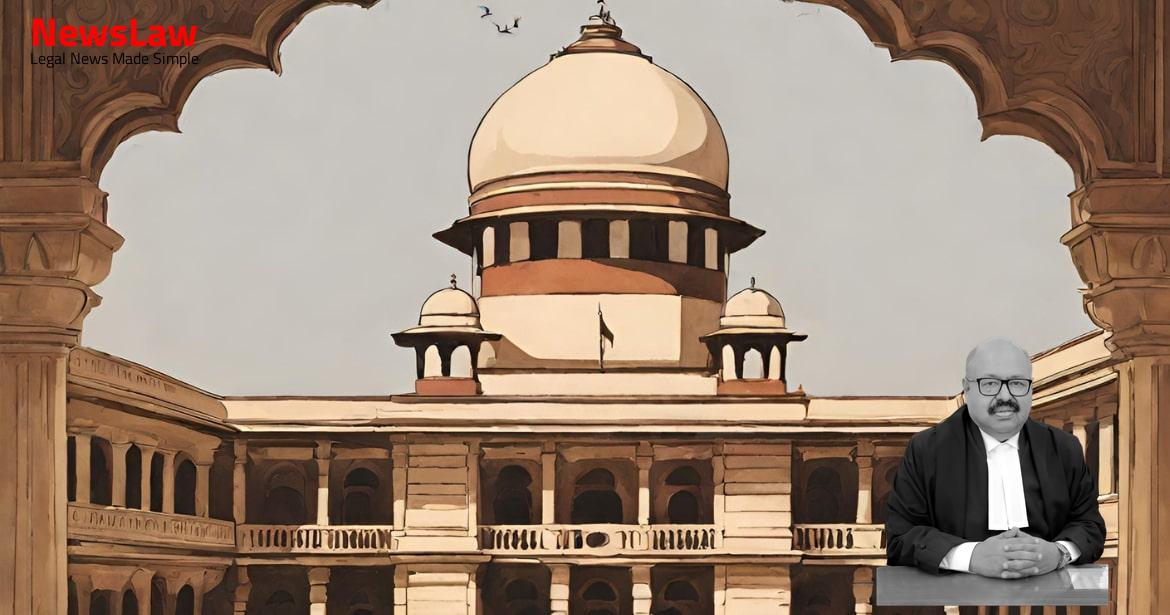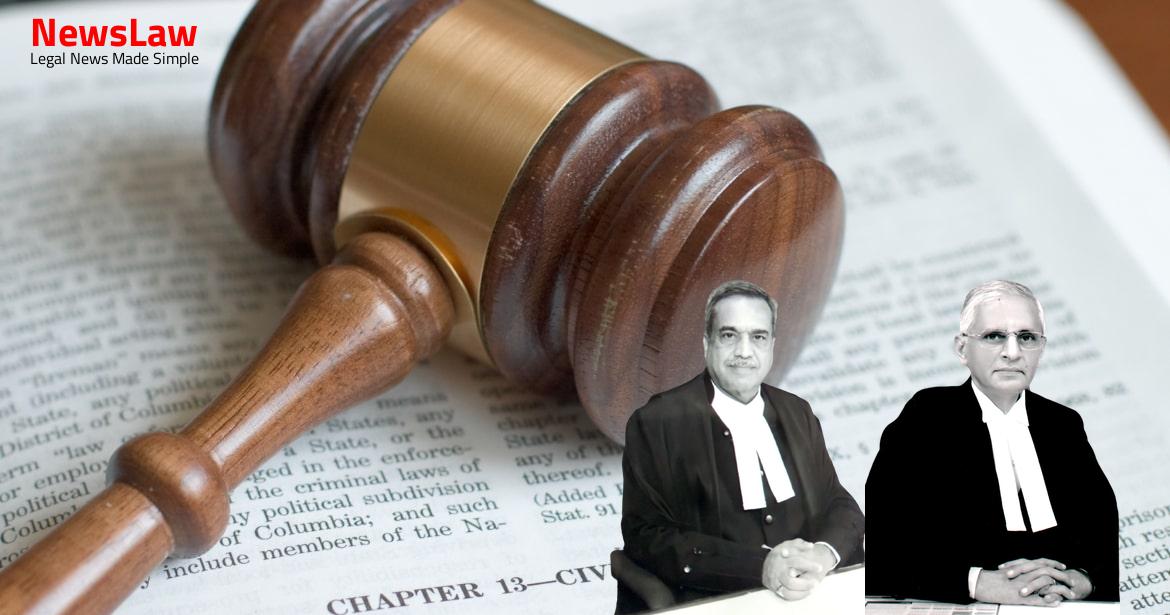The court’s legal analysis on default bail conditions sheds light on the fundamental principles of the Code of Criminal Procedure and the significance of personal liberty. This summary emphasizes the crucial aspects of the case where the court reviewed and clarified the conditions for obtaining default bail under Section 167(2), Cr.P.C. Stay informed on the latest legal developments in the realm of criminal law by exploring the nuances of this judgment.
Facts
- Original accused preferred appeals against the order to deposit Rs.8,00,000/- to the credit of crime No 31 of 2019 before the learned Judicial Magistrate.
- The default bail/statutory bail under Section 167(2), Cr.P.C. is considered mandatory if investigation is incomplete and chargesheet not filed within the specified time under Section 167 Cr.P.C.
- The High Court accepted the appeal but imposed a condition of depositing Rs.8,00,000/- based on an earlier undertaking by the appellant’s wife to deposit Rs.7,00,000/- during a bail application.
- The appellant filed an application before the High Court to modify the deposit amount and daily reporting condition, which was dismissed by the High Court.
- High Court directed appellant to approach the Magistrate Court for any modifications needed.
- The appellant approached the High Court seeking release on default bail/statutory bail.
- The learned Sessions Court dismissed the application for default bail/statutory bail citing non-compliance with earlier bail conditions.
- The appellant filed another application in the Sessions Court for default bail/statutory bail under Section 167(2) of the Cr.P.C.
- The appellant had been in jail for over 101 days without completion of the investigation or filing of the final report by the police.
- The appellant’s wife filed an affidavit pledging to pay Rs.7,00,000/- out of the total amount due, with the balance to be paid later.
- The learned Magistrate released the appellant on bail with the condition to deposit Rs.7,00,000/- and the remaining amount by a specified date.
- The appellant challenged the bail conditions before the High Court.
- The appellant was arrested for offences under Section 420 of the IPC in Crime No.31 of 2019.
- Non-compliance with the earlier bail condition was argued not to prevent the appellant from getting default bail/statutory bail under Section 167(2) of the Cr.P.C.
Also Read: Court’s Legal Analysis in Tax Law Challenge
Arguments
- Conditions (b) and (d) imposed by the High Court for releasing the appellant on default bail/statutory bail under Section 167(2), Cr.P.C. are contested as contrary to the scheme of Section 167.
- The scheme of Code of Criminal Procedure emphasizes personal liberty, where an accused cannot be detained by the Police without the submission of a charge sheet within the stipulated time frame of 60 or 90 days.
- The appellant’s entitlement to default bail under Section 167(2), Cr.P.C. is highlighted based on the completion of investigation period without a chargesheet being filed.
- The affidavit filed by the appellant’s wife for depositing a certain amount for regular bail under Section 437, Cr.P.C. should not hinder the appellant’s right to default bail/statutory bail under Section 167(2), Cr.P.C.
- The High Court’s acceptance of the appellant’s right to default bail/statutory bail, but with a condition to deposit a specific amount, is questioned as deviating from the statutory provisions of the law.
- Mr. Jayanth Muthuraj, representing the State, supported the impugned order passed by the High Court.
- The wife of the appellant previously filed an affidavit to deposit Rs.7,00,000 when the alleged amount was Rs.15,67,338.
- Condition to deposit Rs.8,00,000 for releasing the appellant on default bail/statutory bail was deemed excessive.
- The purpose of granting default bail/statutory bail would be defeated by imposing such a high deposit amount.
- The only considerations required for default bail/statutory bail are the expiry of the statutory period for chargesheet filing and the accused being ready to furnish bail.
Also Read: Judicial Review of Delayed Writ Petition
Analysis
- The High Court imposed a condition on the appellant to deposit Rs.8,00,000 while granting default bail, which is not permissible.
- Imposing a deposit condition frustrates the purpose of default bail under Section 167(2), Cr.P.C.
- The only requirement for obtaining default bail is that the accused has been in jail for more than 60 or 90 days, depending on the case, and the investigation is not completed.
- No chargesheet should be filed within the specified time limit, and the accused must apply for default bail and furnish bail.
- Accused is entitled to default bail/statutory bail if no chargesheet is filed within 60 or 90 days
- Accused must apply for default bail and be prepared to furnish bail
- Default bail is subject to the eventuality in Section 167, Cr.P.C.
- Imposing a condition for the appellant to cooperate with the investigating officer and remain present for investigation when called for is sufficient.
- If the appellant breaches this condition, the investigating officer can request the court to cancel bail.
- The condition imposed by the High Court for the appellant to report daily at 10:00 a.m. for interrogation is deemed too harsh and unsustainable.
Also Read: Ownership Dispute: Legal Analysis on Admission and Decree
Decision
- The condition directing the appellant to deposit Rs.8,00,000/- for default bail is quashed and set aside.
- The appellant is now directed to cooperate with the investigating agency and report to the concerned police station when called for interrogation.
- Non-cooperation may lead to consequences including cancellation of bail.
- All other conditions imposed by the High Court are maintained.
- The appeals are allowed as per the mentioned terms.
Case Title: SARAVANAN Vs. STATE REP. BY THE INSPECTOR OF POLICE (2020 INSC 600)
Case Number: Crl.A. No.-000681-000682 / 2020



